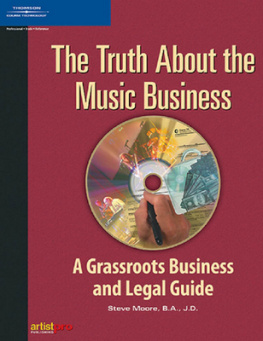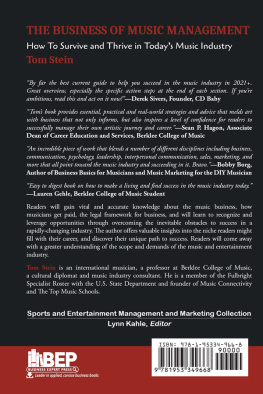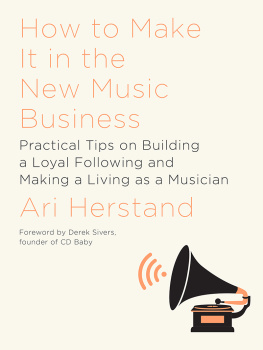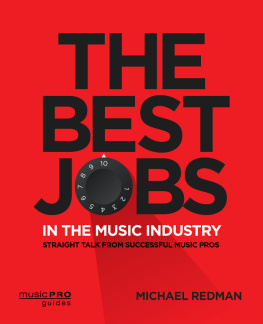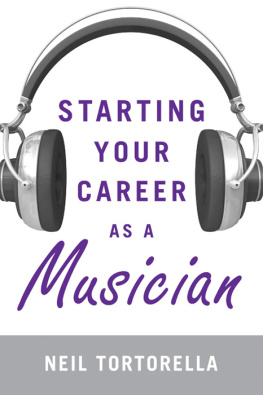The Truth About the Music Business
A Grassroots Business and Legal Guide
Hardware Keys or Dongles
Some software will not work unless you have the proper hardware. This is true of Pro Tools and other digital input/output (I/O) devices that allow you to record music on your computer. If the music industry would come up with a hardware device you could plug into your computer, the same way as a USB key or dongle, you could play your music without the record companies or copyright owners worrying about whether you acquired it illegally. But there would have to be a standard device that would accept all types of protection schemes. Otherwise, you would never know whether what youve bought will work with most players.
Unfortunately, this type of solution is fraught with problems when it comes to protecting music, and perhaps would be better used for software protection. And no matter what protection schemes come up, theres always going to someone who figures out how to get around it.
Software and Site Regulations
Perhaps another solution to stem the tide of illegal file sharing is to place the onus on the software manufacturers to police the users of their software. These companies could be forced to place notices on their software to educate the consumer about copyright infringement and thus try to prevent illegal file sharing. Some say thats
like asking the fox to watch the henhouse, but there could be an administrative body created to help monitor these sites or software applications. That would be a whole lot cheaper than paying the judicial system to prosecute these matters, and then the penal system to house and feed the violators. Shutting down peer-to-peer networks and similar sites, or even making the development of this software illegal, will open up a whole host of problems for both the consumers and the manufacturers.
One has to consider the number of bands that do not wish to protect their music from file sharing, and that want the promotional value they get from people sharing their music. Are we going to stifle their ability to be successful in the name of the RIAA and the record labels that oppose file sharing? What about bands, duos, and solo acts that download music only to learn that song and then go play it live, thereby exposing that song to more and more people? Doesnt that have some inherent promotional value to the original artist? Isnt covering another artists song the sincerest form of flattery? Are we going to arrest the creators of fan sites with song lyrics, chord charts, and lead sheets that allow the fans to learn their favorite artists songs? Obviously, some of this new legislation to criminalize even the smallest amount of alleged infringement is overreaching and draconian.
Despite all of these suggestions, which may or may not be feasible, let us not forget about legislation. If there were good legislation on the books and a good way to enforce that legislation, it would be much easier just to go ahead and pay for music rather than acquire it illegally. The legislature should be able to come up with a decent solution that protects copyright owners
without using draconian measures or imposing such stiff penalties that the rest of the citizenry has to pay for the expense.
New Legislation
One of the problems with digital rights is that the technology is so new and continues to change so quickly, there is just no way for the law to keep up. The legislature must go through the paces of drafting proposed legislation and discussing it openly on the floor of the Senate and the House. If the bill passes these tests, it may be signed into law. Unfortunately, it takes so long to get a bill passed that by the time its enacted into law, the digital landscape has already changed and the bill may not have any real significance anymore.
To make matters worse, most of the politicians who are voting on these issues dont really know or care much about musicians and artists but for some reason are willing to listen to the RIAA. These lowly musicians and artists dont have the political muscle, much less the cash, to contribute to the political action committees that put so much money into these politicians favorite programs.
However, you may see some serious changes now that the movie industry is beginning to feel the pinch from illegal copying. Dont be surprised to see a whole lot more pressure on Washington to do something about illegal file sharing and copying. Once DVDs are as commonplace as CDs and people can download entire movies in a short period of time, you will see a lot more legislation. But unfortunately, time marches on, whilst
the legal system crawls on its hands and knees through the shattered glass of the hopes and dreams of all the songwriters and other copyright owners.
Will the Market Bear Itself Out?
Many argue that the market will just bear itself out. File sharing will subside or at least even out, and more money will be made by legal downloads, etc. For the most part this is true. As more and more content becomes available over the Internet, people will either allow advertising to drive revenues or decide to pay for the content that they feel is most important. As it stands now, the major labels are pretty much in control of the radio markets. Therefore, to maximize profits, they promote a small number of top-selling acts, and a lot of very talented bands get left by the wayside. Unfortunately, this leaves us, the consumers, with homogenized corporate music on the radio and in the stores. Furthermore, this current system makes it very difficult for bands that arent on the major labels to break out in bigger markets and gather larger fan bases.
However, the Internet is quickly changing our current landscape and making music more and more available. Up and coming bands can distribute their music over the Internet and reach markets throughout the world. Unfortunately, the Internet is such a huge place that the problem is not finding music but rather finding the music that you like. As more and more portals or communities crop up, the easier it will be to find the types of music that you like, while at the same time more variety will be available. This will also change the current marketing schemes for standard record stores. They will have to offer customized compilation CDs on demand or risk going out of business.
However, the real questions is, how is the law going to affect what people can do with their music?
Where Is the Law Headed?
There is really no way to predict which way the law is headed. In fact, the law will usually stay several steps behind technology, which will continually evolve at incredible rates. The law cannot dictate morality and expect the people to follow like lemmings. People are always going to find new and inventive ways to circumvent existing protection schemes, and theyll continue to engage in what many of us deem illegal activity.
There will need to be some serious changes in the way the music industry looks at its business structure. Just because change is resisted doesnt mean that its a bad thing. Just like Wal-Mart has put tons of smaller stores out of business, smaller businesses that provide good content through the Internet are going to put a major dent in the major record labels sales. There is just no way to say that you have to do business a certain way and the market will change with the technology. Unfortunately, the law is always going to be one step behind.
One thing that we can do is look at recent laws that have been passed, so that we can begin to understand where we are, as well as make some informed guesses as to what the future will bring.
DRMDigital Rights Management
This is not a law, but rather a means to determine if the law is being broken. Many content providers have developed software that enables them to ensure safe and secure distribution, and to prevent illegal distribution of paid content over the Internet. This type of technology is called Digital Rights Management, and its being developed to protect purveyors of copyrights from file sharing. Its designed to allow creators to maintain a close watch on their intellectual property, and to determine the means by which content can be used, reused, purchased, copied, and/or distributed by the people who acquire it legally.
Next page
